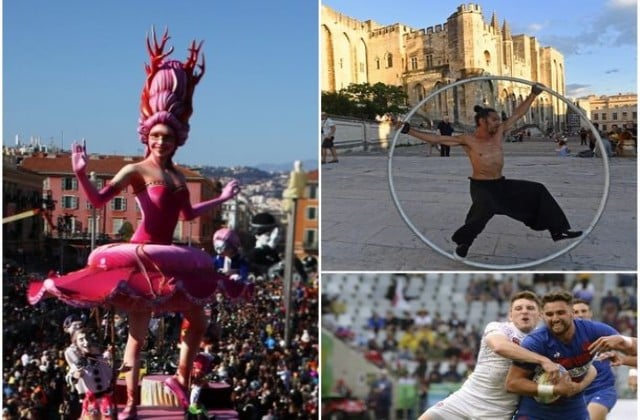1. Chinese New Year in Paris, January 25th
Every January, to celebrate the Chinese, Vietnamese and and Korean New Year (Têt), Paris and its suburbs transforms into a magical, fairytale of a festival, featuring dragon parades, lion dances and martial arts shows, markets, parades, exhibitions and conferences.
It's a great sight for anyone visiting the city during an otherwise grey January month. Full program here.
2. Six Nations Rugby, Paris, February 2st – March 14th
If you're in France and you like rugby, this is an event not to miss out on. Paris' Stade de France will host France v England on February 2nd, expect face painting, fireworks (literal and metaphorical) and many, many renditions of La Marseillaise.

Expect the unexpected when France meet England on the rugby pitch. Photo: AFP
3. Strasbourg Mon Amour, February 7th – 17th
The already cute city of Strasbourg is turning even cuter as it switches on its most romantic vibe to heat up the chilly February temperatures.
For 10 days, Valentine’s Day included, the will be more than 40 special, love-themed events all over the city. Concerts, stand-up performances, photo exhibitions, art shows, museums and dinners – all in the name of love.
4. The Nice Carnival, February 15th – 29th
Nice also turns up the heat when it hosts the 136th edition of its annual carnival, themed 'Roi de la mode' (King of Fashion).
Dancers, artists and musicians gather in the city for a days-long feast and a 'traditional flower battle' (which the organisers promise to be 80 percent locally produced). Last year they distributed 21,000 tonnes of mimosa to the public. Just saying.
5. Paris International Agriculture Salon, February 22nd – March 1st
Every year, farmers from all over France take their finest cattle, pigs and hens and drive for miles to show them off at the Parisian Salon d’Agriculture.
It's a unique, fascinating event where countryside and city all of a sudden merge into one, slightly smelly room. In addition to farm animals, visitors can scout the country's mightiest politicians.
It’s a widely known secret that anyone with presidential ambitions must visit the salon to show that they know the ‘real France’ – and that they appreciate not only its fine cheeses, but also the cow that made it.

Former president Jacques Chirac, right, was known for his ability to connect with the people he met, but he also knew how to cuddle a cow. Photo: AFP
6. Tour de France, June 27th – July 19th
Cycling enthusiasts can expect the 107th edition of the Tour de France to contain three weeks of highly intense competition on difficult terrain before the winner finally rolls into the capital.
For those wanting to see the kick off, the Grand Départ will be in Nice on Saturday, June 27th.
7. Festival d’Avignon, July 3rd – 23rd
Founded in 1947, the Avignon annual arts festival is the oldest existing festival in France. As one of the world’s most important theatre festivals, it’s definitely worth a visit, if only for the sight of the beautiful Gothic courtyard of the Palais des Papes, where the festival is held.
The 2020 program will be released on March 25th.

A street artist performs in Avignon in France. Photo: AFP
8. Revolutions Exhibition La Villette, April 22nd – August 23rd
‘1966-1970, Five Years that Changed the World’ is the title of the massive collection of 400 art installations that together tell the story of how a global, idealistic youth made lasting change on the world they sought to change.
The Paris 1968 movement, the Summer of Love in San Francisco, the Woodstock hippies – they're all there.
9. Lyon Dance Biennale, September and October 2020
For five full weeks this autumn Lyon literally transforms into a dance floor.
The event includes 40 different shows and additional street performances of ballet, hip-hop, salsa, contemporary dance and circus dance. It’s a hot tip for anyone who likes a good swing, or just to look at people who know how to do it.
10. Nuit Blanche in Paris, October 3rd
Every year, on the eve of the first Saturday in October, the French capital lights up under a multitude of art exhibitions, light shows, concerts and performances as the city stays up all night.
For anyone visiting the city, this is a magnificent way to experience Paris at night. On the (huge) plus side: transport is free and runs all night.



 Please whitelist us to continue reading.
Please whitelist us to continue reading.
Member comments